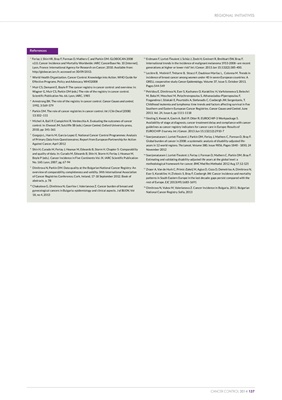
The political declaration of the High-level Meeting on
the Prevention and Control of Non-communicable
Diseases that was adopted by the UN General
Assembly as Resolution 66/2 at its third plenary meeting on
19 September 2011 placed a strong emphasis on the need to
create multisectoral solutions to control the growing epidemic
of non-communicable diseases (NCDs) in low- and middleincome countries (see Table
1). This emphasis reflected the
growing recognition that very few of the social determinants
of health can be directly influenced by health care
professionals or health policy-makers alone. A "whole-ofgovernment"
approach is required that addresses NCDs and
ensures that health-related considerations are taken into
account as an integral part of the policy-making process of all
government departments.
A high proportion of patients presenting with advanced
cancers in developing countries may be largely due to the
lack of knowledge (public, professional and political) about
the early signs of cancer, to the lack of local and regional
infrastructure, poverty and the high cost of treatments but a
further reason is also the recurrent cost of journeys to
distant centres for treatment. India has a long running
scheme that helps defray the rail travel costs of cancer
patients and their carers attending hospital for treatment.
Cancer Control invited the Ministry of Railways in India to
provide the following description of its concessionary fare
scheme as an example of an established multisectoral
approach designed to improve access to treatment for
cancer patients on lower incomes.
Fare concessions for cancer patients
Indian Railways offer a wide range of rail travel services
among which lower class travel is one of the most inexpensive
transportation services in the world. Apart from being a lowcost passenger transportation
system and the largest
passenger transportation system in terms of passenger
kilometres, Indian Railways has also been discharging a critical
social obligation towards nation building. This social
obligation manifests itself, among other things, in the form of
concessions extended to various travellers which include
senior citizens, the disabled, students, kisans (small farmers
and agricultural workers), war-widows and people with lifethreatening diseases. The travel
concessions offered to
cancer patients also demonstrates how Indian Railways
discharge their social obligations entirely on a voluntary basis.
Background to concessions for cancer patients
In post-independence India, travel concessions were
introduced in the early 1950s for students and kisans with the
twin purpose of furthering education and nation building.
Available records show that the concession for cancer
patients was first introduced in 1957. The concession offered
the following features:
‰ The concession was 75% of the full fare.
MULTISECTORAL INITIATIVES IN
CANCER CONTROL: FARE
CONCESSIONS FOR CANCER
PATIENTS ON INDIAN RAILWAYS
RAJENDER KATARIA (LEFT), MINISTRY OF RAILWAYS, NEW DELHI, INDIA AND MARK LODGE
(RIGHT), INTERNATIONAL NEWORK FOR CANCER TREATMENT AND RESEARCH UK
Access to cancer care is not just about affordable medicines and treatment facilities, it can
also be about removing physical barriers to receiving treatment. For increased early
detection and the problems of late presentation, lowering the cost of travel for patients and
their carers can be a constructive initiative. Since 1957, the Ministry of Railways in India has
developed a concession scheme for cancer patients and their carers which has proved
beneficial and evolved with new features over the decades. This is a practical, and
copyable, example of a multisectorial approach to cancer care.
REGIONAL INITIATIVES
138 CANCER CONTROL 2014